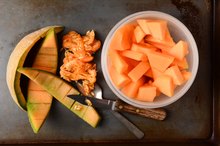What does fact checked mean?
At Healthfully, we strive to deliver objective content that is accurate and up-to-date. Our team periodically reviews articles in order to ensure content quality. The sources cited below consist of evidence from peer-reviewed journals, prominent medical organizations, academic associations, and government data.
- "British Medical Journal"; Erythrocyte choline concentrations and cluster headache; J. de Belleroche et al; January 1984
- "British Medical Journal"; Erythrocyte choline concentrations and cluster headache; J. de Belleroche et al; January 1984
The information contained on this site is for informational purposes only, and should not be used as a substitute for the advice of a professional health care provider. Please check with the appropriate physician regarding health questions and concerns. Although we strive to deliver accurate and up-to-date information, no guarantee to that effect is made.
Choline & Headaches
Choline is considered an essential nutrient for humans and often grouped with the B vitamins because of its physiological effects. Choline also is to synthesize the neurotransmitter acetylcholine, a brain messenger involved in higher brain functions and muscle control. Some studies, particularly from the 1980s, indicated that low levels of choline in the bloodstream are linked to certain types of migraine headaches.
If you are experiencing serious medical symptoms, seek emergency treatment immediately.
Choline
Choline is not a vitamin, but it is an essential nutrient that must be obtained from dietary sources. In addition to being needed for acetylcholine synthesis in the brain, choline is an essential component of cell membranes and helps the liver and gallbladder function normally, as cited in “Biochemical, Physiological and Molecular Aspects of Human Nutrition.” Choline also is important to the health of the myelin sheaths that cover nerve fibers and allow for efficient transmission of electrical brain signals 14. As such, choline is associated with higher brain functions, such as memory, mood and cognition.
Choline and Cluster Headaches
Citicoline Vs. Choline
Learn More
There is some research that links low levels of choline to cluster headaches, severe migraine-like headaches that occur in predictable clusters over many days. An study published in a 1984 edition of the “British Medical Journal” found that the red blood cell choline levels in those suffering from cluster headaches was significantly less than an age-related control group. Further, when lithium was given for pain relief, the patient’s choline concentrations rose 78 times above the control level, indicating a cause-and-effect relationship. Some health professionals have made the correlation between high choline levels and reduced incidence of all migraine headaches, but not all varieties of migraine have the same triggers or involve the same biochemistry, as cited in “The Mechanism and Management of Headache. 3”
- There is some research that links low levels of choline to cluster headaches, severe migraine-like headaches that occur in predictable clusters over many days.
- Some health professionals have made the correlation between high choline levels and reduced incidence of all migraine headaches, but not all varieties of migraine have the same triggers or involve the same biochemistry, as cited in “The Mechanism and Management of Headache.
Choline Recommendations
There is no FDA dietary recommendations for choline, but it does have a suggested adequate intake, which is 425 mg per day for women and 550 mg for men. Choline is found in many foods, particularly beef liver, eggs, fish, chicken, milk, cauliflower, spinach and wheat germ. Choline cannot be taken directly as a dietary supplement, which is why lecithin is recommended as a substitute. For those suffering from headaches, migraines and cluster varieties in particular, supplementing with lecithin might be a beneficial experiment, as it is completely safe with no known side effects.
- There is no FDA dietary recommendations for choline, but it does have a suggested adequate intake, which is 425 mg per day for women and 550 mg for men.
- For those suffering from headaches, migraines and cluster varieties in particular, supplementing with lecithin might be a beneficial experiment, as it is completely safe with no known side effects.
Deficiency Issues
Will Choline Help Me Lose Weight?
Learn More
Choline is found in many foods, but those who shy away from meats and eggs are at risk of deficiency. In addition to cluster headaches, choline deficiency has been linked to liver disease, reduced kidney function, neurological disorders, memory deficiencies, infertility, high blood pressure, muscle twitching, bone abnormalities and the promotion of cancer, as cited in “Human Biochemistry and Disease. 5”
Related Articles
References
- “Biochemical, Physiological and Molecular Aspects of Human Nutrition”; Martha Stipanuk; 2006
- "British Medical Journal"; Erythrocyte choline concentrations and cluster headache; J. de Belleroche et al; January 1984
- “The Mechanism and Management of Headache”; J.W. Lance M.D. et al.; 2000
- “Vitamins: Fundamental Aspects in Nutrition and Health”; G. Combs; 2008
- “Human Biochemistry and Disease”; Gerald Litwack; 2008
- Gibb AJ. Choline and acetylcholine: what a difference an acetate makes! J Physiol (Lond). 2017;595(4):1021-1022. doi:10.1113/JP273666
- Zeisel SH, Da Costa KA. Choline: an essential nutrient for public health. Nutr Rev. 2009;67(11):615-23. doi:10.1111/j.1753-4887.2009.00246.x
- Nurk E, Refsum H, Bjelland I, et al. Plasma free choline, betaine and cognitive performance: the Hordaland Health Study. Br J Nutr. 2013;109(3):511-9. doi:10.1017/S0007114512001249
- Bertoia ML, Pai JK, Cooke JP, et al. Plasma homocysteine, dietary B vitamins, betaine, and choline and risk of peripheral artery disease. Atherosclerosis. 2014;235(1):94-101. doi:10.1016/j.atherosclerosis.2014.04.010
- Fischer LM, Dacosta KA, Kwock L, et al. Sex and menopausal status influence human dietary requirements for the nutrient choline. Am J Clin Nutr. 2007;85(5):1275-85. doi:10.1093/ajcn/85.5.1275
- Caudill MA. Pre- and postnatal health: evidence of increased choline needs. J Am Diet Assoc. 2010;110(8):1198-206. doi:10.1016/j.jada.2010.05.009
- Da costa KA, Gaffney CE, Fischer LM, Zeisel SH. Choline deficiency in mice and humans is associated with increased plasma homocysteine concentration after a methionine load. Am J Clin Nutr. 2005;81(2):440-4. doi:10.1093/ajcn.81.2.440
- Sherriff JL, O'Sullivan TA, Properzi C, Oddo JL, Adams LA. Choline, Its Potential Role in Nonalcoholic Fatty Liver Disease, and the Case for Human and Bacterial Genes. Adv Nutr. 2016;7(1):5-13. doi:10.3945/an.114.007955
- NIH Office of Dietary Supplements. Choline. Updated July 9, 2019.
- Zheng Y, Li Y, Rimm EB, et al. Dietary phosphatidylcholine and risk of all-cause and cardiovascular-specific mortality among US women and men. Am J Clin Nutr. 2016;104(1):173-80. doi:10.3945/ajcn.116.131771
- Institute of Medicine (US) Standing Committee on the Scientific Evaluation of Dietary Reference Intakes and its Panel on Folate, Other B Vitamins, and Choline. Dietary Reference Intakes for Thiamin, Riboflavin, Niacin, Vitamin B6, Folate, Vitamin B12, Pantothenic Acid, Biotin, and Choline. Washington (DC): National Academies Press (US); 1998.
- Bertoia ML, Pai JK, Cooke JP, et al. Plasma homocysteine, dietary B vitamins, betaine, and choline and risk of peripheral artery disease. Atherosclerosis. 2014 Jul;235(1):94-101.
- Caudill MA. Pre- and postnatal health: evidence of increased choline needs. J Am Diet Assoc. 2010 Aug;110(8):1198-206.
- Fischer LM, daCosta KA, Kwock L, et al. Sex and menopausal status influence human dietary requirements for the nutrient choline. Am J Clin Nutr. 2007 May;85(5):1275-85.
- Nurk E, Refsum H, Bjelland I, et al. Plasma free choline, betaine and cognitive performance: the Hordaland Health Study. Br J Nutr. 2013 Feb 14;109(3):511-9.
- Zheng Y, Li Y, Rimm EB, et al. Dietary phosphatidylcholine and risk of all-cause and cardiovascular-specific mortality among US women and men. Am J Clin Nutr. 2016 Jul;104(1):173-80.
Writer Bio
Owen Bond began writing professionally in 1997. Bond wrote and published a monthly nutritional newsletter for six years while working in Brisbane, Australia as an accredited nutritionalist. Some of his articles were published in the "Brisbane Courier-Mail" newspaper. He received a Master of Science in nutrition from the University of Saskatchewan.









